|
|
|
Sort Order |
|
|
|
Items / Page
|
|
|
|
|
|
|
| Srl | Item |
| 1 |
ID:
102957
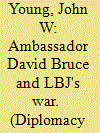

|
|
|
|
|
| Publication |
2011.
|
| Summary/Abstract |
Recent decades have seen growing historical interest in "second rank" officials who, whilst they do not play a leading role in government or political movements, can influence the way decisions are shaped and executed. At the same time, the interest of scholars in American policy during the Vietnam War shows no signs of abating. This article investigates the experience of one second rank official during the war, David Bruce, who was Ambassador to London during 1961-1969. Making particular use of Bruce's extensive diaries, it traces his shifting views on the war, looks at the extent to which he shared the outlook of other official,s and asks what influence, if any, he had on events. It argues that, whilst he always remained loyal to his own government and often mirrored the outlook of the Johnson Administration, Bruce had his own perspective on events, was consistently critical of American tactics on the ground, and, in Spring 1967, influenced by Robert McNamara, became an early advocate of retrenchment.
|
|
|
|
|
|
|
|
|
|
|
|
|
|
|
|
| 2 |
ID:
189258
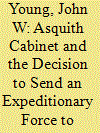

|
|
|
|
|
| Summary/Abstract |
The decision to send the British Expeditionary Force to France has been much discussed from the perspective of its long-term military-strategic background. Yet where the eventual decision to despatch the Force in August 1914 is concerned, limited attention has been paid to the role of the British Cabinet, which gave political approval to the step. Some historians have highlighted a Cabinet decision of 1 August against sending the BEF abroad and pointed out that Prime Minister H.H. Asquith and two key ministerial allies – Lord Haldane and Sir Edward Grey – accepted it. No one has provided a full analysis of why this trio of ministers consistently stuck to their position over the following days. Nor does a full explanation exist of the Cabinet’s eventual agreement, on 6 August, to approve the despatch of the Force. This analysis addresses these questions, arguing that far from being some reluctant step forced on the interventionists by their anti-war colleagues, Asquith, Haldane, and Grey pre-emptively decided to delay the despatch of the BEF. They did this as a way of preventing the disintegration of the government, while leaving open the possibility that Britain would go to war.
|
|
|
|
|
|
|
|
|
|
|
|
|
|
|
|
| 3 |
ID:
048962
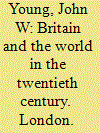

|
|
|
|
|
| Publication |
London, Arnold, 1997.
|
| Description |
xi, 250p.
|
| Standard Number |
0340540133
|
|
|
|
|
|
|
|
|
|
|
|
Copies: C:1/I:0,R:0,Q:0
Circulation
| Accession# | Call# | Current Location | Status | Policy | Location |
| 039701 | 327.41/YOU 039701 | Main | On Shelf | General | |
|
|
|
|
| 4 |
ID:
048360
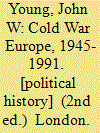

|
|
|
|
|
| Edition |
2nd ed.
|
| Publication |
London, Arnold, 1996.
|
| Description |
x, 292p.Pbk
|
| Standard Number |
0340625163
|
|
|
|
|
|
|
|
|
|
|
|
Copies: C:1/I:0,R:0,Q:0
Circulation
| Accession# | Call# | Current Location | Status | Policy | Location |
| 041479 | 940.55/YOU 041479 | Main | On Shelf | General | |
|
|
|
|
| 5 |
ID:
132411
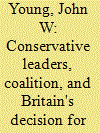

|
|
|
|
|
| Publication |
2014.
|
| Summary/Abstract |
Conservative leaders may have had a decisive impact on the decision by the Liberal government to enter the Great War in August 1914. In a seminal article of 1975, Keith Wilson argued that their readiness to fight "cut the ground … from beneath the feet of the non-interventionists" in the Cabinet. Those ministers who had hitherto opposed war now recognised that continued divisions could bring the government's collapse, in which case the Unionists, probably in a coalition with pro-war Liberals, would take office and enter the conflict anyway. Since Wilson's essay, important light has focussed on Unionist thinking by works that look at the July Crisis as part of a longer party history. This analysis provides a detailed investigation of the actions of Unionist leaders in the days immediately leading to war. It resolves some of the main contradictions in the primary evidence, argues that the possibility of a coalition was very real and demonstrates that one key player-the first lord of the Admiralty, Winston Churchill-subsequently tried, with some success, to disguise his activities.
|
|
|
|
|
|
|
|
|
|
|
|
|
|
|
|
| 6 |
ID:
163691
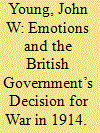

|
|
|
|
|
| Summary/Abstract |
Recent years have witnessed increasing interest amongst international historians in the impact of emotions on foreign policy decisions as part of a broader movement usually known as the ‘emotional turn’. This trend is associated with findings from the field of neuroscience that cognition and emotion—rather than operating independently—remain inextricably bound together in human decision-making. Most work thus far has concentrated on American foreign policy since 1945, but this analysis broadens the focus to consider the impact of emotions on British decision-makers, especially Cabinet ministers, as they debated whether to go to war in 1914. It shows that despite a tendency by the protagonists themselves to interpret their actions in rational terms, sufficient evidence of emotions exist in the written record to allow a fresh approach to the July Crisis. Whilst emotions must be seen as acting alongside rational mental processes, rather than regularly over-powering them, a focus on the subject helps explain different approaches taken by individual ministers, why the majority came to approve intervention in the conflict, and how Prime Minister Herbert Asquith, partly by appearing to control his feelings, minimised resignations over the fateful decision. It also allows a new view about why the Cabinet decided to go to war on 4 August in defence of Belgium, despite deciding just a few days earlier that the question of fulfilling the 1839 guarantee of Belgian neutrality was ‘one of policy than of legal obligation’.
|
|
|
|
|
|
|
|
|
|
|
|
|
|
|
|
| 7 |
ID:
100671
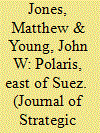

|
|
|
|
|
| Publication |
2010.
|
| Summary/Abstract |
This article investigates the little-known plans formulated by Harold Wilson's Labour government to deploy Polaris submarines in the Indo-Pacific region. The scheme was first proposed in 1965 as a response to several problems faced by British policy-makers, including China's acquisition of a nuclear capability, Britain's wish to maintain a meaningful position 'East of Suez' at reduced cost, and German pressure for equal treatment within NATO on nuclear matters. Despite extensive high-level discussion, the plans were finally abandoned in mid-1968, as Labour moved more decisively to forsake the world role.
|
|
|
|
|
|
|
|
|
|
|
|
|
|
|
|
|
|
|
|
|